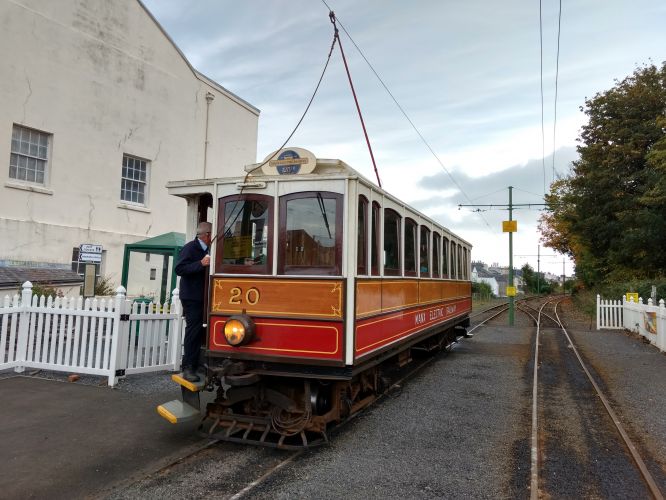"The government minister in charge of the island’s transport network says the Manx Electric Railway will continue to run to Ramsey as long as he has a say.
Infrastructure Ray Harmer said the suggestion that the MER should run just from Douglas to Laxey made no sense.
He also gave a commitment to keeping vital bus routes running.
The minister attempted to give the assurances in the light of concerns over a suggestion in a consultants’ report that transport chiefs should look at whether it was worth keeping the full MER line in operation.
He told the Isle of Man Examiner that while there could be opportunities to make savings, reducing the length of the MER line, or for that matter the steam railway line, would be a mistake.
‘It is never going to happen on my watch,’ he said. ‘The heritage railways are part of the visitor and tourism experience.
‘As an island, we have to protect what we have, because once it is gone, it is gone.’
The Manx Electric Railway, which celebrated its 125th anniversary this year, runs from Douglas to Ramsey, although it is less busy in the Laxey-Ramsey section.
A report by consultancy firm Systra, drawn up as part of the SAVE campaign to cut government costs, said that in 2017-18, it cost about £4.87m to run the island’s railways. They generated £1.66m of revenue, directly, and therefore required a £3.41m subvention.
However, the report also acknowledged that the tourism spend linked to the railways was worth £4.5m per year for the economy and £4.05m of operating costs were returned to the economy through wages of third-party spending.
It said that data suggested the use of the Laxey-Ramsey section of the line was ‘much less’ than the Douglas-Ramsey section and proposed that ‘detailed survey work is conducted to examine the value of this section of line and its importance as part of the full MER/Snaefell Mountain Railway network’.
When the SAVE report, including the Systra analysis, was debated in Tynwald, Garff MHK Daphne Caine said she suspected the Treasury wanted to close all the heritage railways. That earned a rebuke from Treasury Minister Alfred Cannan who branding her the minister at the ‘department for scaremongering’.
He said the aim was to get ‘better value’ from the heritage railways.
Mr Harmer also said he was committed to the bus network and that the SAVE programme would not result in sweeping cuts to services.
In the same SAVE debate, fears were raised that community services could be sacrificed as part of the battle to make efficiencies.
Mr Harmer told the Examiner: ‘The SAVE programme is about carrying added value through efficiencies, therefore it is not about cutting services.
He said praise for Bus Vannin in a consultants’ report published in advance of the SAVE debate had been largely overlooked.
That report, by The TAS Partnership, stated: ‘The current system works. It delivers the services, the fleet is modern and Bus Vannin is not short on innovation.
‘Fares are reasonable and we do not consider that the subvention allocated to Bus Vannin to be excessive.’
It said that, for the £6.1m subvention, the DoI ‘gets a lot from Bus Vannin’, a view reiterated by Mr Harmer.
‘There are efficiencies that can be made, that is why we are coming forward with a strategy. There are things we can do around the budget, internal resources.’
But he added: ‘In my view, cutting services is not SAVE.’
Rather than axing routes that still played an important social service for a small community, he said the bus service could look at the feasibility of demand-responsive services.
‘Particularly in the northern parishes, there is quite a comprehensive bus service, but only one or two people actually on the bus,’ he said.
‘You can consolidate that so you are not running empty buses, you are running smaller buses with more people, maybe less frequently but more flexible. A double decker bus on some of those routes is not really efficient.’
Mr Harmer also defended the new airport dial-a-ride service.
It has grown from the patient transfer scheme which saw Bus Vannin transferring people from the north of the island to the airport, if they needed to fly away for a medical appointment.
Now, for a £10 flat fare for adults, residents in the north, including Kirk Michael and Ramsey, can book a journey from their home to the airport. Children are charged £5.
The Manx Taxi Federation has branded the scheme, part of a 12-month trial, anti-competitive and says its drivers will lose trade.
Mr Harmer said the main focus of the trial was primarily the patient transfer side, rather than the dial-a-ride for other passengers, which aims to emulate demand-responsive travel schemes in the UK.
‘At this point, we don’t really know how it is going to pan out,’ he said."
